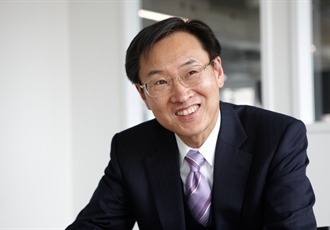Minoru Usui talks about the future at Epson.
The Buzz interviewed Usui and discovered some insights to the company and the man who runs it. Usui said that technology would change the workplace of the future by making it a more creative place allowing workers to use their imagination and take away the routine hum drum of office work and that there would be technology that would reduce costs and improve the environment.
He expanded on the environment by explaining that the use of paper should be reduced and at the very least reused which is why Epson launched its Japan PaperLab that recycles paper. Usui explained that these environmental technologies are important to the company and that every product made is designed with this in mind and that the company is based on Sho Sho Sei principles which are “to develop products that are efficient, compact and high precision. All our products are based around these principles and by their very nature, they are energy saving and contribute to the environment.”
Usui proudly added: “Epson was the first company in the world to declare that it would not use CFCs in its production processes. Environmental concerns are a very important part of our product design and development process.”
The company uses robots for the mundane tasks instead of people so that workers can concentrate on being more creative and Epson are looking to grow this side of the business, said Usui and then touched on 3D printing which he said was limited at present to plastic models and that there are barriers to this kind of printing such as the kind of materials that can be “fired from printers” as well as “precision and productivity” and that the company is researching to create a 3D printer that overcomes these problems.
Usui said that as a laser printer manufacturer the company was aware of the “drawbacks such as cost, toner dust, electricity consumption and so on and that changing to inkjet precision printing will have a major impact on office efficiency”.
Talking about Epson’s Moverio Smart Glasses the CEO explained how they allow “people to repair extremely complex pieces of machinery hands-free, by having the instructions on their eyes in front of them, or have people speaking to them remotely” and that the digital technology was also useful for building repairs and rebuilding old structures.
The Epson policy is to spend around six percent of annual revenue on research and development which focuses on inkjet, visuals, wearables and robotics while other areas are software development and materials technology, explained Usui.
Asked what he found most exciting about his job the CEO answered: “Creating products that contribute to efficiency and people’s lifestyles. I find really exciting and challenging the idea of making things that make the world a better place. It is the excitement of creating new technologies and generating new value for the world that really gets me inspired.”

